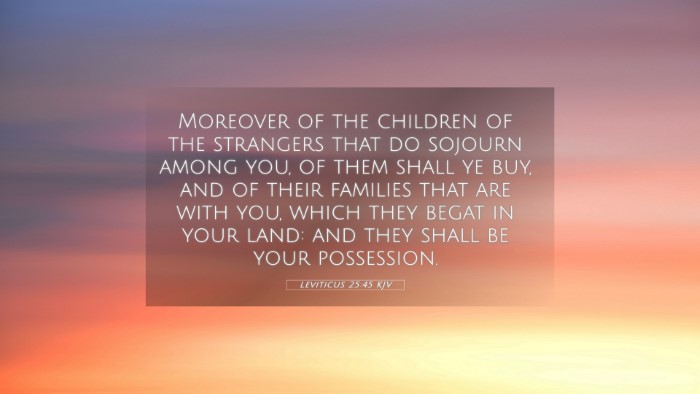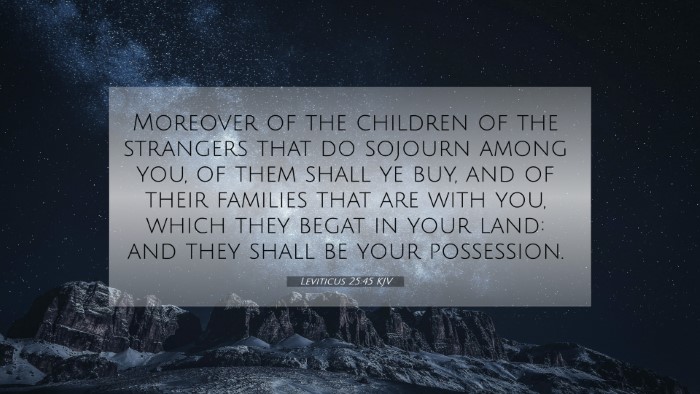Understanding Leviticus 25:45
Leviticus 25:45 (KJV): "Moreover of the children of the strangers that do sojourn among you, of them shall ye buy, and of their families that are with you, which they begat in your land: and they shall be your possession."
This verse addresses the laws concerning slavery and the acquisition of servants from foreign nations. It emphasizes the different status of Israelites compared to non-Israelites in terms of servitude and property. Understanding this requires a deeper exploration of the cultural and historical context of the Mosaic Law.
Key Themes and Insights
- Servitude and Ownership: The verse highlights the parameters around owning servants, specifically from among the nations surrounding Israel.
- Cultural Context: Servitude in the ancient world was common and distinct from the modern concept of slavery.
- Family and Kinship: The mention of families indicates the importance of bloodlines and social structure.
- Rights of Foreigners: The verse reflects on how foreigners were integrated and their rights within Israelite society.
- Theological Reflections: The implications of ownership bring forth discussions on the nature of God’s people and His divine order.
Commentary Insights
Matthew Henry: He emphasizes that God’s commandments also included provisions for the treatment of foreigners and their families, which points to God's overarching concern for humanity and justice. Henry suggests that while the Israelites had the right to own foreign servants, there was still an expectation of humane treatment.
Albert Barnes: Barnes underscores the socio-economic aspects of the law, noting that the wealthy Israelites could afford to purchase foreign servants as a means of enhancing their economic standing. He comments on the necessity of treating these servants with fairness, highlighting a core tenet of the larger biblical narrative—justice towards the marginalized.
Adam Clarke: Clarke interprets the verse with attention to the historical practices of the time, revealing that this was a common practice across many cultures. He notes that the inclusion of foreigners was not only a legal framework but also constituted a moral responsibility to treat them justly.
Cross-References
Leviticus 25:45 can be understood better by examining its connections to other Bible verses:
- Exodus 21:2-6 - Discusses the treatment and rights of Hebrew slaves.
- Deuteronomy 15:12-15 - Further addresses the liberation of Hebrew slaves and the compassion owed to those in servitude.
- Leviticus 22:10 - Prohibits the priest from allowing outsiders to eat holy offerings, highlighting the distinctions within the community.
- Matthew 25:40 - Jesus’ teaching on serving the least of these reflects the ethical treatment of all people.
- Galatians 3:28 - Paul emphasizes that in Christ there are no distinctions, which can be contrasted with Old Testament practices.
- 1 Timothy 6:1-2 - Addresses how Christian slaves are to regard their masters, reinforcing a theme of respect and justice.
- Philemon 1:15-16 - Illustrates the relationship between a master and a runaway slave within the New Testament context.
Thematic Connections and Analysis
In addition to understanding the historical context of Leviticus 25:45, we must also consider its thematic implications:
- Justice and Compassion: The text invites reflection on how we understand justice for those who may be vulnerable or marginalized in today’s society.
- Integration vs. Isolation: It emphasizes a principle of inclusion within the community while maintaining ethical standards for treatment.
- Reflection on Human Dignity: This passage provides a foundation for discussing the inherent dignity of all humans, made in the image of God.
Practical Applications and Reflections
- Personal Responsibility: Believers are encouraged to reflect on how they treat those who serve them, considering equity and justice.
- Community Relations: This verse challenges modern communities to integrate and treat outsiders with respect and kindness.
- Faith and Action: The implications of servitude compel us to consider how we live out our faith in interactions with others.
Conclusion
The exploration of Leviticus 25:45 not only sheds light on ancient customs but also connects deeply with contemporary discussions on ethics, justice, and humanity. Engaging with this text through various commentaries and cross-referenced verses provides a richer understanding of its significance within the broader biblical narrative.
Further Study Tools
For those interested in diving deeper into the connections between Bible verses, consider these tools and resources:
- Bible Concordance - A useful resource for tracking biblical terms and their occurrences throughout scripture.
- Cross-reference Bible Study Methods - Techniques that enhance understanding by linking related passages.
- Bible Reference Resources - Comprehensive materials that aid in finding connections across scripture.
- Tools for Bible Cross-Referencing - Software and guides to streamline the process of finding thematic links.



